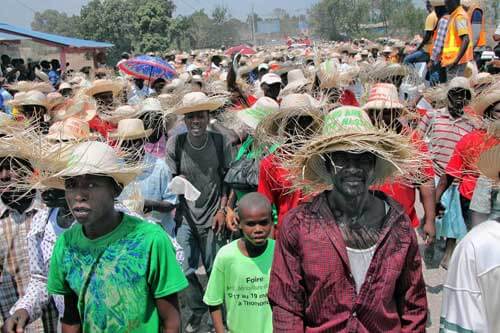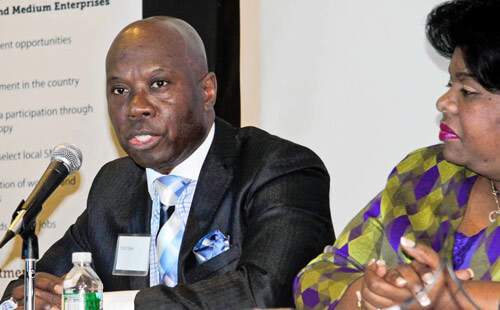“Fighting for food sovereignty” was a major theme of the five–day Congress of Mouvman Peyisan Papay (Peasant Movement of Papay-MPP) that began March 18 in Haiti’s Central Plateau. This year’s Congress with MPP, the Americas’ second oldest peasant organization, celebrated the organization’s 40th anniversary.
From all regions of Haiti and equally represented by women, men, and youth who work the land, 1800 delegates came together at MPP’s Papay training center, about four miles north of Hinche. The goal of this Congress was to define a strategy for the next 10 years and to put forth priorities for the next five years.
Agro-ecology, land reform, and national sovereignty were areas of major concern and support for the week’s Congress. Its motto: “We struggle hard for social change.”
Haitian and international partners, Haitian parliamentarians, dignitaries, delegations from Dominican Republic, South and North America and Europe, shared in the opening festivities. Along with staff, MPP’s Center hosted more than 2,000 persons.
The ceremony began with a “Mystique,” a small playlet, reenacting the historical conflict between government forces –Macoutes–and the peasantry.
Following a heartfelt tribute to Hugo Chavez, the Venezuelan president who died on March 5 and was a great friend to Haiti, the first day’s presentations recognized MPP members and foreigners who work for and with the peasant organization.
Simon Dieuseul Desras, Senate President, who was present, admitted privately that he has yet to see any significant support to the agricultural sector from the current government in spite of its claim that agriculture is a priority.
Between official presentations, MPP’s Dance and Theatre Troupe Ibolele livened things up with rhythmic music and dance.
The assembly then adjourned to the village of Papay for the formal opening of MPP’s new central office, a grand two-story structure, and a seeming palace.
The monies for this came from the peasants, Chavannes Jean-Baptiste, MPP’s director, explains. “They want something that they are proud of and feel respected by.” Dignitaries, champagne, and the press inaugurated the building–with the first floor, only, finished by Congress time.
The second day was filled with panels and discussion. Former Prime Minister and long-time MPP friend, Michele Pierre-Louis and Michel Soukar, discussed national sovereignty. Danielle Magloire spoke about women’s participation and how actual Haitian laws discriminate against women and that without full equality, there can never be real social change. One session drew gasps when it was learned of the grave environment hazards (cyanide, integral to the process, which poisons the water table) wrought by mining gold, a venture in the north the government is actively exploring.
By Wednesday, the assembly had broken into 30 workshops to address the previous day’s discussion, evaluating the last 40 years and the movements‘ weaknesses of which there are many.
It was decided during the week that all MPP structures must have one man and one-woman delegate. Also discussed were political betrayals from so-called friendly politicians, some of whom, after elected, tried to destroy the peasant movement.
Meanwhile, daily, MPP’s community radio station broadcast the Congress live to the region. It was during the last day’s session when word came to the assembly that a local official, on orders from the government, was on his way to shut down the station, having already shut down the Hinche community stations that were rebroadcasting the proceedings.
A roar undulated through the assembly and a call went out to the official, “You’ll have to walk over 1800 cadavers to shut down this station.” The official stopped, turned his vehicle around returning to Hinche, followed shortly after by an apology regarding the “misunderstanding.”
On Friday, the Congress ended with a popular demonstration, marching to Hinche’s central Charlemagne Péralte public square. Oddly, An imposing vehicle from the local police department, along with fully-geared police on foot, preceded the marchers who carried barriers that expressed their positions including: Down with Monsanto, Down with the country’s gold thieves, , Long live national sovereignty, Haiti is not for sale, Down with MINUSTAH (the UN occupying forces.) Messages of protest were also inscribed on straw hats distributed to protect from the brutal Plateau Central sun.
Following the march, delegates began to return to their respective localities to share the week’s events and resolutions for the future with those they represented.

Photo by Tequila Minsky
























